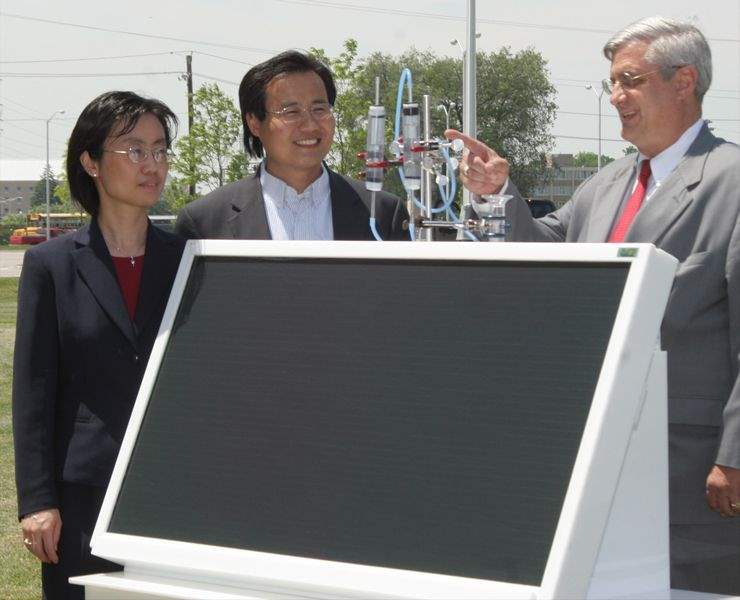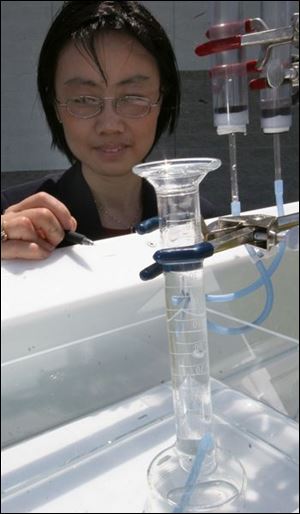
Hydrogen fuels area high-tech firm
6/3/2005
Liwei Xu, Xunming Deng, and Stanley Rubini examine the business end of a solar hydrogen generator.
long / blade

Liwei Xu, Xunming Deng, and Stanley Rubini examine the business end of a solar hydrogen generator.
A Toledo technology company is gaining momentum in its quest to power vehicles with something other than gasoline.
Midwest Optoelectronics LLC, started by University of Toledo professors in 2002, last week introduced what it calls the world's first full-sized integrated photovoltaic electrolysis panel at a U.S. Department of Energy meeting in Arlington, Va.
"The reaction was very strong, very positive," said Xunming Deng, the firm's chairman. The native of China is a physics professor at the university.
The two-foot by four-foot panel generates hydrogen from water using sunlight. The company estimates 170 panels could fuel a typical car for an average of 10,000 miles.

Liwei Xu measures the hydrogen output of an electrolysis panel.
But that's in the future, once the technology is refined.
Right now, the company's three lab technicians are producing panels by hand, with the eventual goal of having enough to set up a demonstration on the roof of the building where the company is headquartered at 2600 Dorr St. The site is home for UT researchers in alternative energy and alternative fuels.
It is hoped such a demonstration will attract partners to help with mass production, said Mr. Deng. The federal government has put emphasis on research in hydrogen as an alternative fuel.
The company's work has been funded by at least $3.5 million in grants from the Department of Energy, the state of Ohio, and other sources.
Energy Department officials declined comment yesterday but Frank Calzonetti, UT vice provost for research, said federal officials told him the research was interesting, and the technology has minimal environmental problems.
The three partners of Midwest Optoelectronics - Mr. Deng, his wife, Liwei Zu, who is president, and Stanley Rubini, a former Dana Corp. executive who is chief executive officer - are finalizing licensing agreements with the university. Those agreements will enable the company to use students in research and the university will share in profits later.
"We eventually hope to make many, many panels that will be sold to the consumer," Mr. Deng said. "They'll be able be able to buy a system and put it on the roof and have enough hydrogen to power a car."
The idea is to make the panels cheaper and more efficient ,so fewer will be needed to power a vehicle.
The goal, which will take years to reach, is to have a 20 by 20-foot section of a house roof dedicated to the panels, producing enough hydrogen to fuel a car for 10,000 miles, the researchers said.
Ms. Xu looks forward to having the research put into practical use.
"Our goal is to have hydrogen produced at the same price of gasoline today," she said.
Contact Mary-Beth McLaughlin at
mmclaughlin@theblade.com
or 419-724-6199.